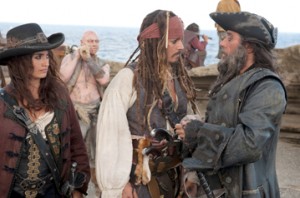Tides sets up possibility of franchise built around Depp
What is a film franchise to do when what was originally supposed to be a supporting character completely hijacks the series? In the case of Pirates of the Caribbean, the answer was to ditch the intended leads and start another set of films showcasing the breakout character, here, Johnny Depp’s mercurial Captain Jack Sparrow.

Waist deep · Jack Sparrow (Depp) and Angelica (Cruz) wade through unfamilar waters in their frantic quest to find for the Fountain of Youth. - Photo courtesy Buena Vista Pictures
Pirates of the Caribbean: On Stranger Tides, the series’ fourth installment, puts Sparrow in the lead exclusively and seats Rob Marshall in the director’s chair previously occupied by Gore Verbinski.
Unsaddled of the story arc that bound the first three films together, On Stranger Tides finds Sparrow caught up in a three-way hunt among the Spanish, the British (led by Geoffrey Rush’s Captain Barbossa) and pirates under the command of the legendary Blackbeard (Ian McShane) for the Fountain of Youth. Along the way, he has to deal with impersonators, zombies — in the traditional voodoo sense, not so much the modern flesh eating kind — and an old flame, Angelica (Penélope Cruz).
It’s a good premise, lifted in large part from Tim Powers’ novel On Stranger Tides, but it gets lost in a muddled script. The main plot takes a long time to kick off, instead spending much of the first act in a seemingly endless set of chase scenes in London. In fact, that tends to be how much of the plot is handled. There are relatively few plot points, but the film dances around each one with lots of action, gags and belligerent sexual tension between Depp’s and Cruz’s characters.
In Tides, the first film centered solely on Jack Sparrow, Depp shows that he is still the master of the character. He manages to change moods and schemes at a drop of a hat, and Depp’s mastery of comically expressive faces gets even a greater chance to shine here than the previous three films. If there’s one fault with Sparrow, it’s that Marshall’s direction makes the film too much of a generic action film for the lead’s manipulative tendencies to really shine.
As the returning Barbossa, Rush is equally at ease in his role, and ends up offering quite a few laughs. McShane is the best part of the new cast, mixing serious threats with a bored disdain for Sparrow.
The weak link in the cast is Sam Claflin’s missionary Philip, or at least the way he’s handled. He plays almost no role in the first half of the film, before suddenly getting a lot of screen time for a weak romantic subplot, which feels a little forced thanks to its abruptness.
None of this is to say that the film is bad — it’s not. There are many entertaining parts (including a wonderful bit of dark humor) but the bloated and unfocused script, mixed with the rather generic directing style leaves it on the weaker end of the spectrum.
Perhaps one of the biggest disappointments lies in the visual look of the film. Although cinematographer Dariusz Wolski stayed on from the previous films, On Stranger Tides looks entirely different from its predecessors. Part of the fault lies with Marshall. Instead of Verbinski’s crisp vistas and touches of surrealism, Marshall focuses more on dark, cramped spaces and replaces the surreal with more comedy, some of which falls flat.
The film also suffers from joining the 3-D craze. Like so many other films trying to capitalize on the gimmick, On Stranger Tides uses very obvious shots designed for 3-D visuals that are clearly forced. It is a bit odd at first, but after the umpteenth shot of someone waving a sword directly at the camera, or swinging to the foreground, the novelty wears thin.
On Stranger Tides is ultimately a mixed success. With the fourth installment in the Pirates of the Caribbean series, Disney was hoping to free it up from the continuity of the previous films and make it accessible to start a new spate of films.
Depp is one of the closest things to a sure bet in the film industry — charming and hilarious, he shows that Jack Sparrow can carry a movie on his own. The film also proves that there are many more premises for the franchise to follow.
Although the film suffers from poor storytelling (the fault for which can be chalked up to both the screenwriters and the director), the premise and cast are solid. In the end, On Stranger Tides has some very entertaining moments but cannot rise above the clutter it leaves in its wake at every plot turn.
